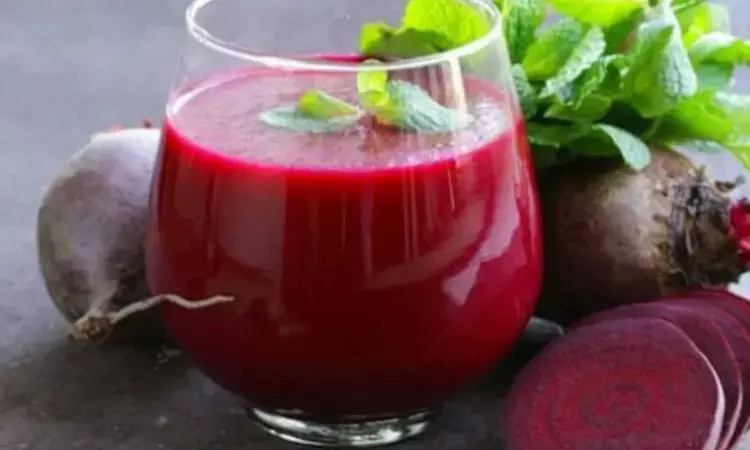- Home
- Medical news & Guidelines
- Anesthesiology
- Cardiology and CTVS
- Critical Care
- Dentistry
- Dermatology
- Diabetes and Endocrinology
- ENT
- Gastroenterology
- Medicine
- Nephrology
- Neurology
- Obstretics-Gynaecology
- Oncology
- Ophthalmology
- Orthopaedics
- Pediatrics-Neonatology
- Psychiatry
- Pulmonology
- Radiology
- Surgery
- Urology
- Laboratory Medicine
- Diet
- Nursing
- Paramedical
- Physiotherapy
- Health news
- Fact Check
- Bone Health Fact Check
- Brain Health Fact Check
- Cancer Related Fact Check
- Child Care Fact Check
- Dental and oral health fact check
- Diabetes and metabolic health fact check
- Diet and Nutrition Fact Check
- Eye and ENT Care Fact Check
- Fitness fact check
- Gut health fact check
- Heart health fact check
- Kidney health fact check
- Medical education fact check
- Men's health fact check
- Respiratory fact check
- Skin and hair care fact check
- Vaccine and Immunization fact check
- Women's health fact check
- AYUSH
- State News
- Andaman and Nicobar Islands
- Andhra Pradesh
- Arunachal Pradesh
- Assam
- Bihar
- Chandigarh
- Chattisgarh
- Dadra and Nagar Haveli
- Daman and Diu
- Delhi
- Goa
- Gujarat
- Haryana
- Himachal Pradesh
- Jammu & Kashmir
- Jharkhand
- Karnataka
- Kerala
- Ladakh
- Lakshadweep
- Madhya Pradesh
- Maharashtra
- Manipur
- Meghalaya
- Mizoram
- Nagaland
- Odisha
- Puducherry
- Punjab
- Rajasthan
- Sikkim
- Tamil Nadu
- Telangana
- Tripura
- Uttar Pradesh
- Uttrakhand
- West Bengal
- Medical Education
- Industry
Dietary nitrate in the form of beetroot juice reduces restenosis after PCI in stable angina: NITRATE-OCT trial

USA: New data from the NITRATE-OCT trial has shown that dietary nitrate may effectively reduce restenosis risks after PCI (percutaneous coronary intervention) for stable angina. Nitrate may be consumed in the form of beetroot juice.
Findings from the NITRATE-OCT trial, a small, randomized trial out of the U.K., were presented during a Late-Breaking Trial session at Cardiovascular Research Technologies (CRT) 2023 in Washington, D.C., by Krishnaraj Rathod, St. Bartholomew's Hospital, London, on behalf of the investigators of the NITRATE-OCT study.
"The study is the first randomized-controlled trial evaluating the use of dietary nitrate to reduce restenosis rates in patients undergoing PCI for stable angina," the authors noted. "The results will determine the potential of dietary nitrate as adjunctive therapy in stable angina patients."
Stable angina is an area of significant morbidity impacting 14.1 million people in the U.S. and 1.3 million in the U.K. PCI can be an effective treatment for stable angina, complications including stent thrombosis and restenosis remain relatively common. The cost of complications after PCI is estimated to be around $15 billion, leading may look for options to lower the risks of such adverse outcomes after PCI.
The study included 300 participants. 150 were randomized to receive either a nitrate-rich beetroot juice and 150 to a nitrate-depleted beetroot juice, of whom 190 were followed up at two years, 194 were followed up at one years, and 208 were followed up at six months.
At baseline, participants from both the trial's arms were predominantly male and white and had an average age of 61.59. Also, the participants had a similar incidence of diabetes (both 22%), previous myocardial infarction (36.7% vs 37.3%), hypertension (73.3% vs 74%), and comparable body mass index (BMI) scores (28.81 kg/m2 vs 28.95 kg/m2).
The study's primary endpoint was the restenosis assessment, made by measurement of in-stent late-loss evaluated by QCA (quantitative coronary angiography) at six months ± 1 month.
Secondary endpoints were assessments of MACE (major adverse cardiac events) at 24, 12, 9, and 3 months and mechanical information such as inflammation, measuring markers of platelet reactivity, change in flow-mediated dilation, and NO pathways.
The study led to the following findings:
- Once a day, oral dietary nitrate for six months was safe and well tolerated in patients with stable angina undergoing elective PCI with stent implantation.
- Dietary nitrate significantly reduced late lumen loss (LLL) at six months, with approximately a 53% reduction in LLL compared to the nitrate-depleted placebo arm (stent LLL: 0.117 mm vs 0.244 mm; segment LLL: 0.055 mm vs 0.269 mm).
- Alongside a reduction in LLL, a trend toward a reduction in 2-year MACE was noted.
"Our findings indicate that dietary nitrate may have a therapeutic role in restenosis reduction following PCI for stable angina," the researchers wrote. "The findings now warrant further investigation in larger clinical trials."
Dr Kamal Kant Kohli-MBBS, DTCD- a chest specialist with more than 30 years of practice and a flair for writing clinical articles, Dr Kamal Kant Kohli joined Medical Dialogues as a Chief Editor of Medical News. Besides writing articles, as an editor, he proofreads and verifies all the medical content published on Medical Dialogues including those coming from journals, studies,medical conferences,guidelines etc. Email: drkohli@medicaldialogues.in. Contact no. 011-43720751


